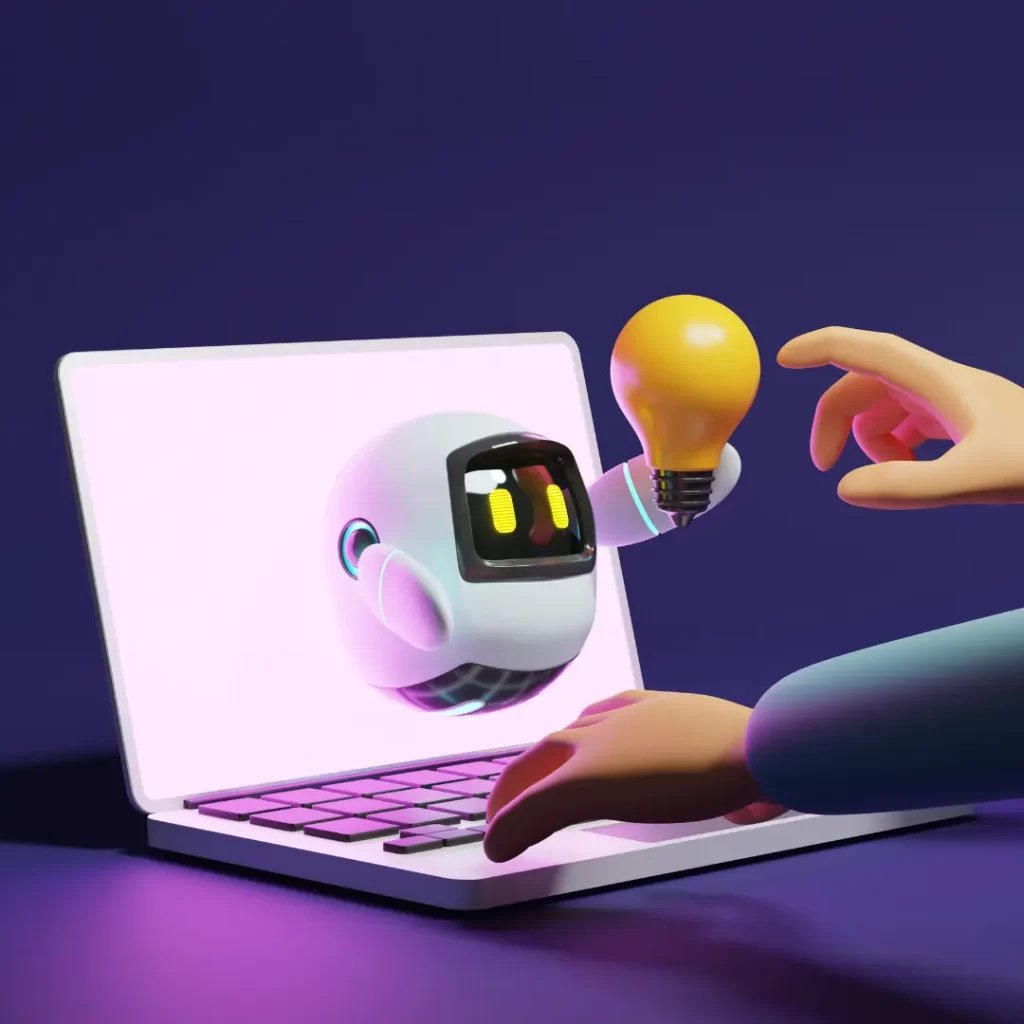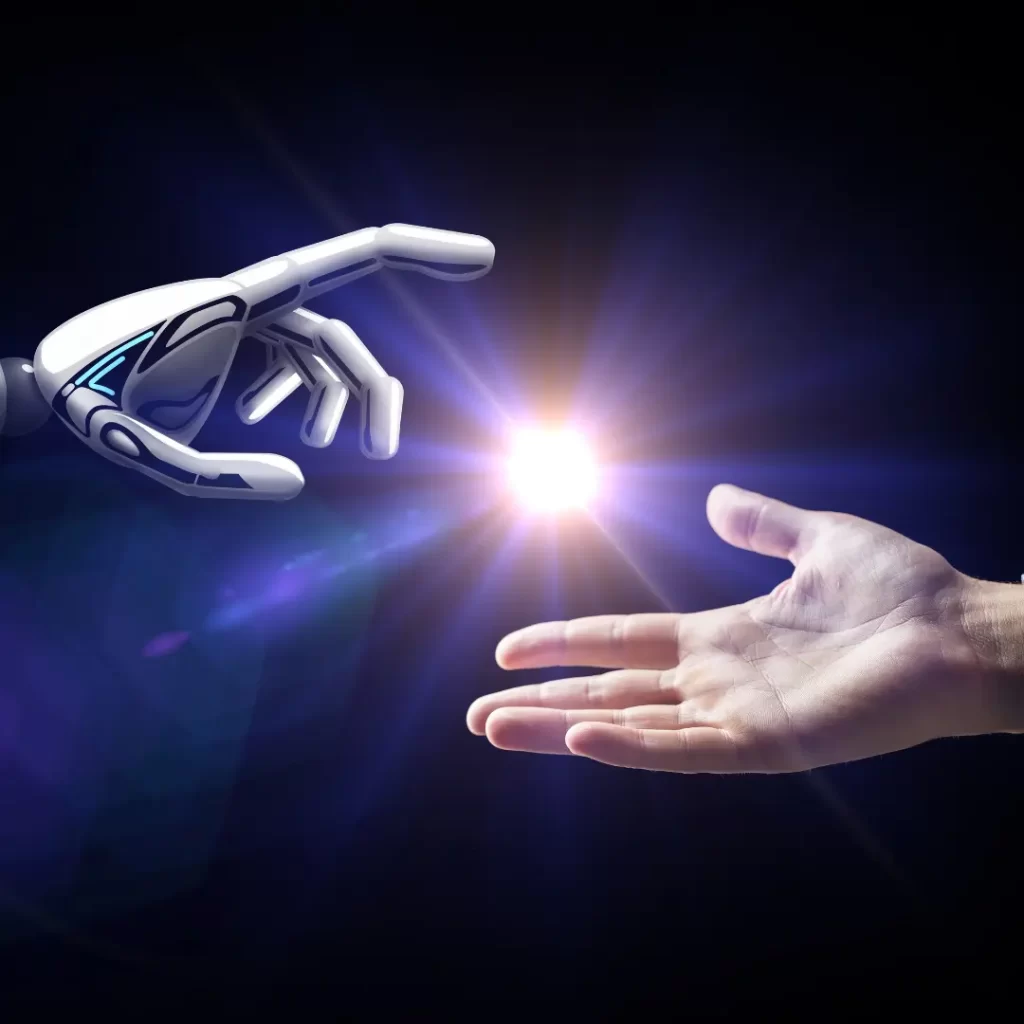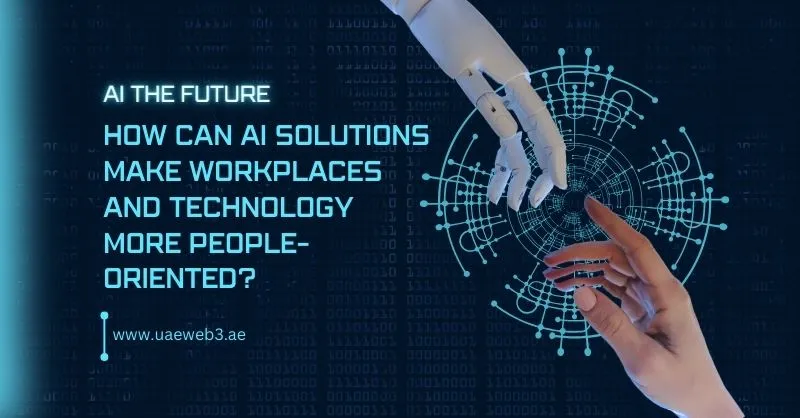How can AI Solutions Make
Workplaces and Technology More People-Oriented?

Companies that develop artificial intelligence are expanding more quickly because more businesses are beginning to embrace these cutting-edge AI technologies.
Artificial intellect (AI) is both a theory and the field of developing computer systems that will need human intellect for tasks like speech recognition, interpretation, visual perception, and decision making.
AI is developing quickly as a result of better algorithm design, increased network computer power, and enhanced capacity for storing and capturing vast amounts of data.
AI is getting increasingly accurate in the medical arena as well; with the assistance of qualified medical professionals, it can now diagnose conditions like cancer, heart attacks, and other illnesses.
AI is likewise seen as an interdisciplinary discipline with a variety of methodologies. The development of deep learning and machine learning in every industry sector has led to a paradigm change.
AI is capable of three things: learning, reasoning, and self-correction. So, a lot of people are worried that their jobs may go as AI develops. However, the paragraphs that follow cover this subject.
Synopsis
The new AI systems that are being launched have cognitive capacities that surpass those of humans. People are becoming increasingly concerned that their jobs may become less human in the future.
Thanks to AI capabilities, the majority of monotonous and physical labor will be automated. Furthermore, programming and data science are two more quantitative tasks that can be automated thanks to AI.
As these talents become automated, artificial intelligence (AI) solutions will play a significant role in helping human professionals advance up the skill ladder into areas like empathy, creativity, sense-making, and social skills that are specific to humans and cannot be mechanized by machines.
Therefore, rather than making the workplace less people-oriented, AI will make it more people-oriented. Therefore, there’s no need to fear because this will always be regarded as a gift from God to humanity. People will need to change careers and pick up new skills, albeit not everyone will find this simple.
Robotic Apocalypses
Recent popular culture and science-fiction films have something to do with robots turning against humans once humans are replaced by robots.
However, it becomes quite easy for many people to picture a world in which human emotions and interactions will be devalued and machines will take over human decisions, workplaces, and hobbies.
For everyone, productivity will be the most important factor, and robots can be more productive than humans in this regard.
A lot of artificial intelligence systems, aside from the more conventional ones, are already emerging. These systems are capable of operating customer support bots, automated grocery checkout lanes, and self-driving cars.
There are already a plethora of incredible advancements in the realms of computer vision, natural language processing, and strategy board games that go beyond what people can now imagine.
The deployment of AI makes it easy to sustain global economic growth, particularly when aging and declining natality are dragging the economy down.
Many people believe that AI solutions will eventually replace humans, costing them their jobs and negatively affecting workplace relationships.
Stopping and Rewinding
While this could be the first thought that crosses everyone’s mind, the real question is whether or not it is accurate in its entirety. Will AI take over the workplace and replace human workers with machines that lack social skills?
Human Employment and Competencies
Artificial Intelligence will be integrated into the workplace by augmenting human talents rather than taking over jobs. Although artificial intelligence won’t replace jobs, it will help automate certain job-related skills. Employ committed developers that can fulfill all of your requirements for this project.
A job is a precise set of abilities performed for remuneration and plays a function in any culture. For instance, it might be argued that software developers need a variety of talents, such as the ability to code, test software in accordance with client requirements, and oversee less experienced engineers.
Depending on how ready automation is, human talents can fall into one of three categories:
• Intelligence-based quantitative reasoning skills. Problem-solving skills, logical and numerical thinking, language proficiency, programming, and an awareness of analytics are a few examples.
• Process-oriented abilities including physical and repetitive tasks in highly organized and predictable environments. These abilities are in charge of about half of the tasks that people carry out in their daily lives. Creating things, constructing homes, accounting procedures, etc. are a few instances.

Automation of Workforce Transitions and Skills
AI will have a positive and varying degrees of impact on each of the three skills. Certain facts suggest that machines will outperform people in the domain of process-oriented and quantitative reasoning skills, but humans will outperform machines in the domain of cross-functional reasoning skills.
Because of this, it can be estimated that 80 percent of tasks that are process-oriented are completed by AI systems; as a result, business mobility solutions are employing a significant number of AI developers.
When it comes to quantitative reasoning skills, people and robots will split the labor evenly in half, but when it comes to cross-functional reasoning skills, humans will be in the lead and play an 80 percent role.
As a result, some occupations will experience a decline in interest while others will flourish, and many more will experience significant changes.
People will need to transition from aging professions to expanding ones, and in certain situations, they may need to adjust to new circumstances. A company that develops mobile applications has already begun to transition to AI development.
Machines and Process-Oriented Skills
The majority of process-oriented skills will be performed by machines, sometimes referred to as “no-collar workers.” These non-collar employees will be crucial in carrying out duties like loan approval and making judgment calls over which customers should be onboarded or flagged as fraudulent.
Chatbots and other virtual personal assistants will handle administrative responsibilities. The robotic customer service representatives will be able to comprehend, diagnose, and decide what has to be done in order to address a variety of consumer inquiries.
The primary responsibilities that humans will have include managing and troubleshooting these non-collar workers, as well as focusing on increasing their productivity.
For instance, supermarkets are setting up automated checkout systems. The human cashier serves as the checkout assistant in these systems, answering customer inquiries, troubleshooting issues, and monitoring the machines reserved for automated checkouts of supermarkets.
Ability to Reason Quantitatively
As previously said, machines and humans will perform mathematical reasoning skills equally, hence good cooperation is required.
Both human and machine laborers will collaborate flawlessly and in unison while working together. Certain stages for performing simpler activities, such as processing data or adhering to procedures, will be taught to machines.
The machines will also be able to sense when a human is having a problem of any type, and they will be prepared to support or aid the human. Numerous mobile app development businesses use AI developers as part of their services.
The identification of can research is one of the biggest examples of how human-machine collaboration can lead to the best performance.
As per some sources, AI can comprehend roughly 92% of scans on its own, while humans can comprehend 96% of scans on their own and 99% when combined.
Businesses that plan to assign some activities to humans and others to machines must likewise restructure their job roles. Workflows and workspaces will change to make it easier for people and machines to collaborate.
The idea that the warehouse’s architecture might work is among the best examples. Certain sections will be dedicated to robots, while other parts will facilitate human-machine interaction. Maintaining the smooth transition between AI requires systematic governance and humans.
The cooperation of humans and robots can lead to the creation of numerous new occupations. They are:
• Simplification consultants will simplify and optimize any organization’s communications, technologies, and processes.

- In order to further sustain wellness, there will be wellness coaches on hand who will be in charge of improving the cooperative interaction between humans and robots.
- Analytics HR will be present to identify trends in talent as well as to develop and implement business, innovative, and talent management strategies.
- An AI interaction designer who will work with staff to translate needs into machine operations will also be present.
Skills for Cross-Functional Reasoning
AI handles process-oriented and quantitative reasoning skills, hence in the case of cross-functional reasoning skills for humans, AI pushes the ladder of expertise upward. Both creativity and social skills will be crucial human traits, and they will only get more so in the near future.
When the employee has more time to devote to focusing on customer experience, workplace culture, creativity, social skills, emotional intelligence, and employee engagement, they will become more empathetic.
More People-Oriented Workplace
The aforementioned requirements will make the task more fulfilling. The organizations will become less hierarchical, more agile, and more collaborative.
Positive outcomes from AI include more free time, more staff satisfaction, more creativity, higher customer satisfaction, and a decrease in employee turnover.
Thus, AI technologies will make the workplace more people-oriented. These days, a lot of jobs that emphasize cross-functional reasoning abilities are growing, including:
- Professional tribes for specific tasks that also serve to assemble a freelance crew.
- Insight enablers, who will support businesses in managing the deluge of newly generated data.
- There are already freelance professors here who will conduct internal training. This will be crucial in improving workforce skill levels.
- UX/UI interaction professionals will also be present; they will be creating novel consumer experiences that will boost loyalty and play a significant part in attracting new business. This will be accomplished by fusing AI’s efficient application with in-depth business understanding.
Programming will continue to grow quickly, and cross-functional reasoning abilities will also rise. These kinds of tasks will be beyond the capabilities of everyone. It’s possible that a new social class is emerging. Some folks won’t only be jobless; they won’t be employable either.
In summary
The AI development industry is expanding more quickly, but there’s still no reason to be concerned because competent workers won’t be laid off. AI innovations will contribute to human progress.
Disclaimer: Above all information is for general reference only and sourced from internet, before making any kind of decision please visit the authorized websites of authorities and service providers.

